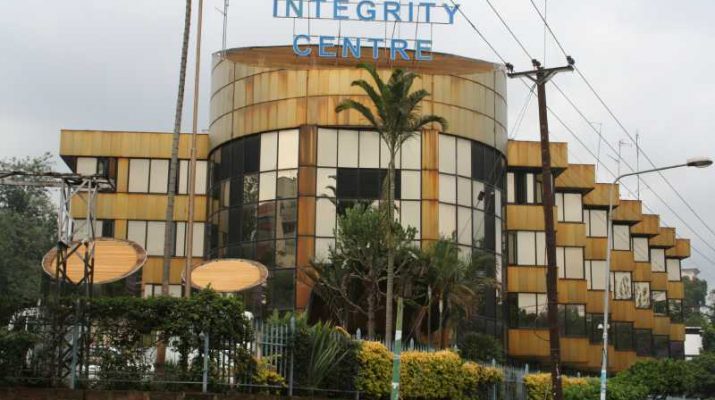Public Service Commission (PSC), today, handed over the Report on Forged Academic Certificates to the Ethics and Anti-Corruption Commission (EACC) and the Directorate of Criminal Investigations, to take legal action against individuals, who used fake certificates to join public service.
Handing over the Report to the two institutions at the PSC House, in Nairobi, the Chairperson of PSC Amb. Anthony Muchiri said falsification of academic certificates has far-reaching implications on service delivery by public institutions, the country’s education system and economic development.
“It also affects the global competitiveness of our graduates at a time when the government is reaching out to various countries, to export labour,” said Amb. Muchiri, assures the public that PSC, will not relent until the issue is wiped from society.
The Chairperson announced that the Commission has provided guidance to the Ministries, Departments and Agencies (MDAs) on initial disciplinary action, that should be taken against culpable employees, which includes dismissal from the service.
Amb. Muchiri said the exercise carried out by the Commission to verify academic and professional certificates of employees in the public service, has revealed that forged certificates have been used for the award of appointments, promotions and re-designation in public service.
He noted that most MDAs with verified cases of forged or fraudulently obtained certificates have instituted disciplinary action, including termination of service for the affected officers, while in others there has been notable inaction without valid reasons.
“Some public institutions have allowed the offenders to resign or proceed on early retirement against section 78 of the Public Service Commission Act, 2017, which stipulates that the Commission or any other appointing authority, should not allow exits from the Public Service,” he stressed.
The Act and Regulation 69 of Public Service Commission Regulations, 2020, prohibits exit on account of fraud, when it is aimed at avoiding anticipated disciplinary case and when the culprit is avoiding outstanding liabilities, owed by the officer to the public body.
He said out of the 53,599 cases of forged certificates referred to Kenya National Examinations Council by 91 institutions for authentication, 1,280 were verified as forged but clarified that the verification is still ongoing and expects the number to increase.
“A total of 195 MDAs including universities and other tertiary institutions have finalized authenticating certificates for 29,314 out of which 787 officers have been verified to have used forged certificates to procure appointment, promotion or re-designation in the public service,” added Amb. Muchiri.
He said the Report also revealed that the most common types of forgeries on the academic certificates involved alteration of Kenya Certificate of Secondary Education (KSCE) mean grades, the alleged candidates of forged KCSE certificates did not sit for the exams but produced the certificate required for appointment.
Other factors were the certificate number of the submitted certificate did not belong to the alleged owner, the certificate had fake names, as the culprit’s name was different from the real owner of the produced certificates, forgery on Bachelor’s Degree certificates Second Division Lower were altered to reflect Second Division Upper, it was also established that alleged candidates have never sat the alleged examination or registered as candidates.
“The fake certificates submitted were disowned by the alleged issuing learning institutions and alleged candidates confirmed as not ever registered in the institutions alleged to have issued certificates,” revealed Amb. Muchiri.
He said a total of 331 institutions are targeted for the exercise namely 52 in all the Ministries, State Departments and Agencies, 239 in all State Corporations and Semi-Autonomous Government Agencies and all 40 public universities.
The Director of Criminal Investigations (DCI), Mr Mohamed Amin, lamented that the hiring of unqualified employees had significant negative effects on organizations across various aspects of their operations.
“We in DCI will play our part diligently by the law and take appropriate action against all the culprits,” he assured and urged for cooperation from MDAs involved to enable his office to expedite the investigations.
Amin said in the year 2023 the Office of DCI managed to investigate a total of 23 cases of alleged forgery of academic and professional certificates and those of unqualified persons masquerading as professionals.
“This is a clear indication that the problem is rampant and it is high time that all organizations took a cue from what the Public Service Commission has done and acted on employees with bogus academic and professional certificates,” he urged.
The Director, however, noted that the war cannot be won by one agency, and urged all institutions to join hands to arrest the menace and meritocracy in the recruitment and promotions of employees.
The Secretary/ Chief Executive Officer of the Ethics and Anti-Corruption Commission, Mr. Twalib Mbarak, said those found culpable of forging certificates, would be deemed criminals and the government would recover what they were paid as salary.
“We request Members of Parliament to amend laws, to enable the country to expedite forgery of certificate cases quickly,’ he urged.
Dr David Oginde, Chairperson of the Ethics and Anti-Corruption Commission, said the Education system is the most powerful tool that can be used to develop a nation, a need that requires the country to preserve the integrity of the education system.
PSC, under provisions of Article 234 of the Constitution, embarked on the exercise of verifying academic and professional certificates of employees in the Public in October 2022 in an exercise that involved the participation of all public institutions, all public and private universities and tertiary institutions and the Kenya National Examination Council.
During the exercise, the Commission directed all Authorized officers in public institutions to undertake an audit of the academic and professional certificates of all officers employed in the last 10 years and to continuously validate academic and professional certificates, before any appointment or promotion.

